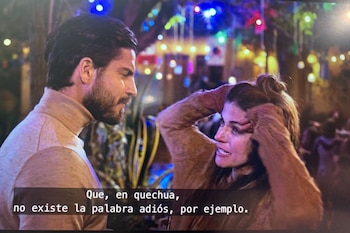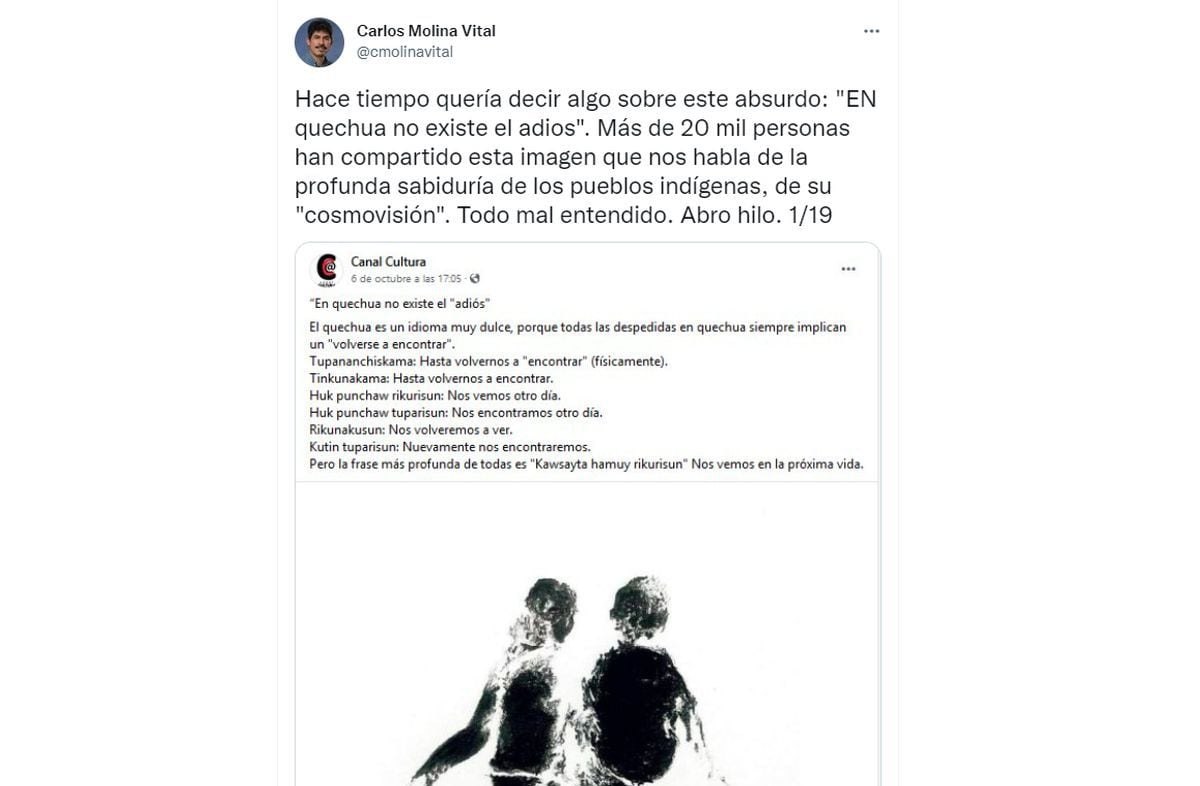
This Friday, March 18, the first film made entirely in Peru under the production of Tondero was released on Netflix. 'Until we meet again' is the name of the feature film starring Stephanie Cayo and Maxi Iglesias.
The film tells the story of Salvador Compodónico, a successful Spanish businessman whose family owns a large hotel corporation in Spain. For the company's first international project, it flies to Cusco, the navel of the world. There he will meet Ariana, a backpacker and adventurous woman who wants to continue developing her life in complete freedom.
The name of the film is due to the fact that the protagonist points out that in the Quechua language there is no such word goodbye. And the closest thing is to say “Tupananchiskama”, which means “until we meet again”.
How real is this statement? Quechua experts came to the forefront on social networks to set the record straight. San Marquino Américo Mendoza, professor of indigenous studies at Harvard and researchers in Quechua, expressed his concern on Twitter. He points out that the film, with a wide range of audiences, replicates “exoticizing (and incorrect) conceptions about the Quechua language and Andean culture. What happened to Netflix?”
He adds that as someone who has been a cultural consultant for film and theater, it is important to clarify that those who plan these things are in charge of production, in this case Netflix and Tondero, and not in the cast of actors.
THE USE OF GOODBYE
Reference is also made to Carlos Molina Vital, a professor, linguist and researcher of Quechua, based in the United States. In October 2021, Molina made a thread on Twitter where she says that it is absurd to say that goodbye does not exist in Quechua. “I have long wanted to say something about this absurdity,” he says and shares a meme that shows the same theory that is shared in the Netflix production. “More than 20 thousand people have shared this image that tells us about the profound wisdom of indigenous peoples, their 'worldview'. All misunderstood.”

He points out that the word “goodbye” has a clearly pragmatic meaning: it has no referential meaning such as' house ',' cat 'or 'bed'. The word is only understood as part of an interaction sequence in which someone closes the interaction, Molina explains.
“You could say 'goodbye' or 'bye' or 'change and out', 'there you see', 'see you later, alligator'... It doesn't matter much what those expressions literally mean; the important thing is that they can mean closure of interaction,” says the expert.
He argues that seeing Quechua as something 'special' because 'in Quechua there is no goodbye' is based on an “exotization”. He also said that in Quechua there were many farewell formulas and varied according to the region. For example, “tupananchikkama” is used in southern Peru as “until we run into each other”, since 'tupay' comes from the Spanish 'topar'. But the word is unknown as a farewell in Bolivian Quechua.
He adds that in Quechua ancashino/Huanuqueño the sequence is used as a farewell:
A: Aywallaa (I'm just leaving)
B: Aywallay (Just go).
An expression “very direct and to the point: Are you leaving? Go then!”
KEEP READING:
Últimas Noticias
Debanhi Escobar: they secured the motel where she was found lifeless in a cistern
Members of the Specialized Prosecutor's Office in Nuevo León secured the Nueva Castilla Motel as part of the investigations into the case

The oldest person in the world died at the age of 119
Kane Tanaka lived in Japan. She was born six months earlier than George Orwell, the same year that the Wright brothers first flew, and Marie Curie became the first woman to win a Nobel Prize

Macabre find in CDMX: they left a body bagged and tied in a taxi
The body was left in the back seats of the car. It was covered with black bags and tied with industrial tape
The eagles of America will face Manchester City in a duel of legends. Here are the details
The top Mexican football champion will play a match with Pep Guardiola's squad in the Lone Star Cup

Why is it good to bring dogs out to know the world when they are puppies
A so-called protection against the spread of diseases threatens the integral development of dogs




